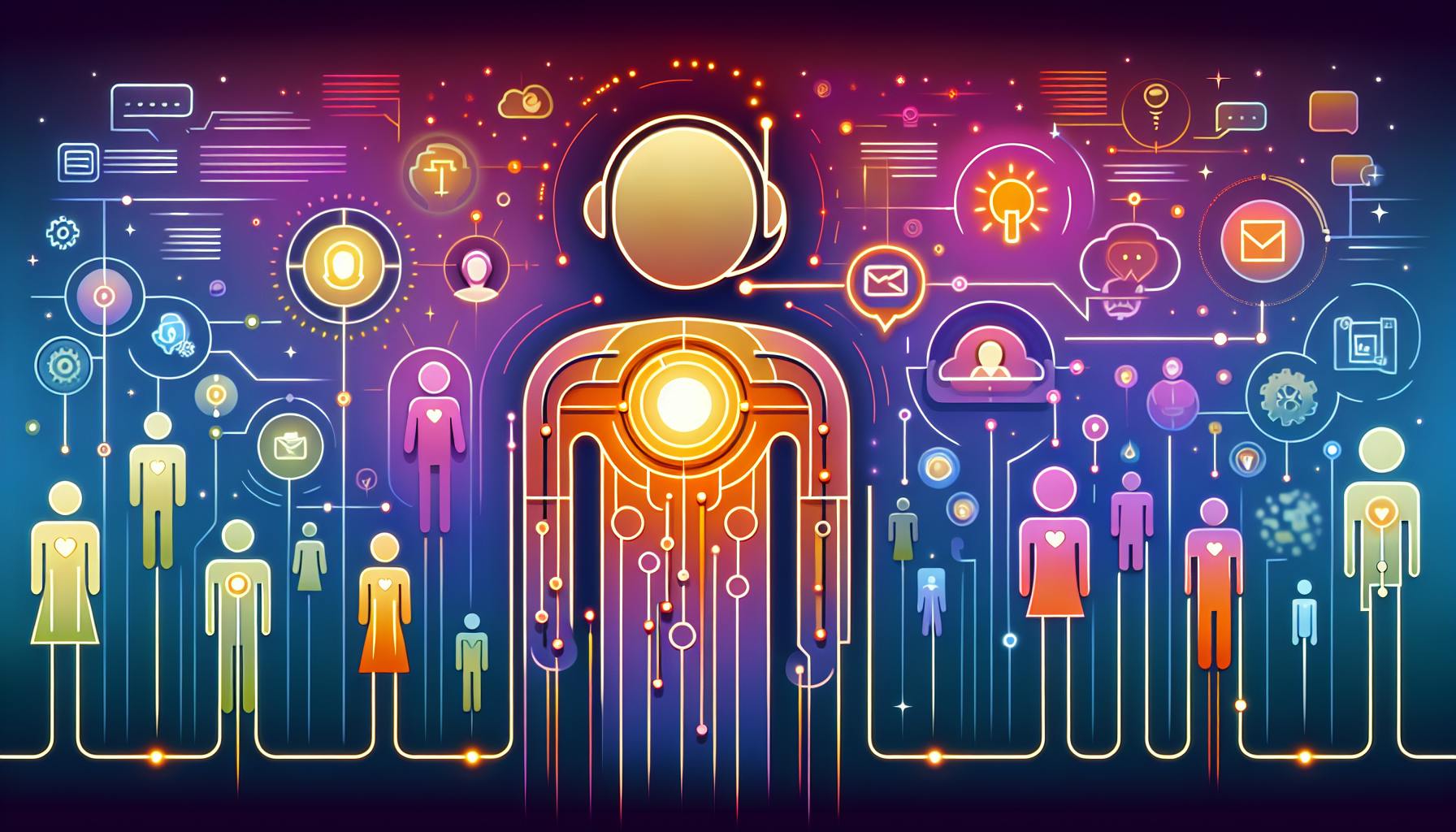Introduction: AI in Application - Custom GPTs Unleashed
The advent of large language models like GPT-3 has enabled the creation of remarkably capable AI chatbots and virtual assistants. Powered by deep learning and vast datasets, tools like ChatGPT demonstrate the potential for AI to have natural, human-like conversations. However, while the foundation provided by GPT-3 is impressive, there are still limitations in relying solely on a generalist model not specifically optimized for certain tasks or domains. This is where the concept of fine-tuning AI models comes into play.
By training versions of GPT-3 on niche datasets and specialized use cases, it's possible to develop custom AI assistants tailored to particular industries, applications, or interests. The aim of this article is to provide an overview of such customized GPT models and highlight a curated directory of specialized bots available to enhance ChatGPT functionality. Whether you need AI capabilities for healthcare, business, tech, creativity or more, there are targeted GPTs that can unlock ChatGPT's potential in specific areas. Let's dive in to see how ai in application is empowering users to get more out of this transformative technology!
Customizing ChatGPT with Targeted GPTs
While ChatGPT provides a strong general knowledge foundation, it has limitations when queried about specialized topics or complex domain-specific information. This is expected since the model was trained on broad content aimed at general capabilities. By fine-tuning GPT-3 models on niche datasets, it's possible to create AI assistants customized for particular industries and use cases.
These specialized GPTs leverage the natural language powers of GPT-3 while focusing its capabilities on targeted knowledge areas. For example, a medical GPT can provide anatomy expertise, analyze patient symptoms, summarize the latest research, and recommend data-driven treatment plans. A business GPT could handle financial modeling, optimize operations, improve customer interactions, and generate reports. Even creative GPTs can be designed for songwriting, fiction plots, graphic design, and more.
The benefit of tapping into such customized models is the ability to equip ChatGPT with specialized skills and knowledge for your specific needs. Rather than expecting one model to excel at everything, users can connect niche GPTs based on their domain and goals.
Healthcare GPTs Offer Specialized Medical Knowledge
Healthcare is a prime area where targeted GPTs can augment ChatGPT to deliver more accurate and relevant insights. For example, MedGPT by Anthropic can analyze patient symptoms and suggest likely diagnoses and care plans. ClinicalGPT by MetaAI summarizes the latest medical research and scientific literature to inform treatment. And Human-AI's SymptomGPT accurately assesses reported symptoms to determine possible causes.
Other capabilities of customized medical GPTs include:
- Explaining anatomy, disease pathology, and health concepts clearly.
- Assisting with clinical workflows and care coordination.
- Generating summaries of medical studies and clinical trial findings.
- Recommending medications and providing pharmacology expertise.
Of course, oversight from medical professionals is still essential for responsible use. But healthcare GPTs demonstrate the potential for AI to enhance patient care when applied appropriately.
Business GPTs Optimize Operations and Finances
GPTs optimized for business can automate workflows and provide data-driven recommendations while interfacing naturally through chat. For example, Anthropic's ClaudeGPT specializes in financial modeling, forecasting, reporting, and data analysis. CoPilot focuses on optimizing operations, improving processes, and boosting efficiency.
Some other common applications include:
- Automated reporting and customized dashboard creation.
- Customer service chatbots with product knowledge.
- Market research, advertising campaign support, and trend analysis.
- Recruiting, onboarding, training, and people operations.
Integrating business GPTs like Claude into operations could drive significant efficiencies. But human supervision is critical to verify insights and maintain accountability.
Creative GPTs Assist with Ideation and Production
For creative professionals, GPTs fine-tuned on texts like plays, poetry, novels, and lyrics can provide unique idea generation capabilities.
For example, Anthropic's ClaudeGPT can be helpful for crafting original lyrics and melody ideas for songs. StoryGPT by MetaAI assists fiction writers with plotting, characters, and settings. And Rytr's PoemGPT creates poetry with diverse styles, forms, and literary devices.
Some potential creative use cases include:
- Screenwriters using AI plot and character suggestions to overcome writer's block.
- Graphic designers filtering AI-produced images to spark new creative directions.
- Poets utilizing GPT-generated lines and passages as inspiration.
However, properly attributing any final work to maintain transparency around AI involvement is crucial for creators.
Specialized GPT Directory for Enhancing ChatGPT
So how can users actually access and implement these specialized GPT models? That's where a curated directory comes into play. The All GPTs Directory provides a centralized catalog of customized GPTs spanning diverse categories to enhance ChatGPT functionality.
With just a few clicks, users can browse GPT alternatives for healthcare, business, tech, creativity, and more. The directory integration allows easily switching ChatGPT to the optimal AI assistant for your specific conversation or task needs.
Healthcare GPT Options
- MedGPT - For medical diagnosis, treatment suggestions, and care planning.
- ClinicalGPT - Summarizes latest research and scientific literature.
- SymptomGPT - Accurately assesses patient symptoms and provides likely causes.
- RxGPT - Recommends medications and provides pharmacology expertise.
- AnatomyGPT - Details human anatomy, physiology, and disease pathology.
Business GPT Alternatives
- FinanceGPT - Financial modeling, reporting, forecasting, and data analysis.
- BizOpsGPT - Optimizes operations, improves processes, and boosts efficiency.
- HRGPT - Handles recruiting, onboarding, training, and people operations.
- MarketingGPT - Provides SEO, social media, advertising, and market research expertise.
- SalesGPT - Generates leads, manages accounts and relationships, and closes deals.
Creativity-Focused GPTs
- LyricGPT - Writes original lyrics and suggests melodies for songs.
- ScriptGPT - Assists with screenplay/teleplay drafting and ideation.
- StoryGPT - Helps build fiction plots, characters, settings, and narratives.
- PoemGPT - Creates poetry with diverse styles, forms, and literary devices.
- DesignGPT - Provides graphic, industrial, architectural design inspiration.
The possibilities are vast when tapping into GPTs customized for specialized domains. Users can unlock enhanced productivity and efficiency by integrating the optimal AI assistants for their needs.
Implementing Custom GPTs into Your ChatGPT Workflow
So how can you actually start leveraging these targeted GPTs within your ChatGPT workflows? Here's a quick rundown of the process:
-
Browse the All GPTs Directory to find specialized GPTs for your industry or use case.
-
Connect your ChatGPT account to integrate access to the custom GPT catalog.
-
When initiating a chat, choose the specific GPT you want to leverage for a particular task or conversation topic.
-
Prompt ChatGPT to utilize the customized GPT you selected to provide focused responses.
-
For hands-off automation, provide conversation contexts for your specialized GPT to handle independently.
-
Monitor outputs and override to generic ChatGPT if needed - specialized GPTs have limitations too!
-
Refine your prompts over time to optimize each custom GPT's performance for your needs.
Integrating niche GPTs takes some trial and error, but the productivity boost for specialized tasks makes it worthwhile. With the right prompting and oversight, ai in application via custom GPTs can significantly enhance what's possible with ChatGPT alone.
Responsible and Ethical Use of AI Assistants
While specialized GPTs open up exciting possibilities, it's crucial we maintain reasonable expectations and employ responsible AI practices.
GPTs have limitations - they can perpetuate harmful biases, generate misinformation, and fail unpredictably. We must provide appropriate human oversight instead of blindly relying on outputs.
Here are some key points for the ethical usage of AI assistants and custom GPTs:
-
Verify outputs, don't treat them as infallible.
-
Ensure transparency by disclosing AI involvement.
-
Watch for biases and limitations, customize with diverse training data.
-
Consider long-term impacts on jobs, inequality, and misinformation.
-
Use AI to augment human capabilities, not replace human roles.
-
Uphold accountability - people must be responsible for how AI systems are built and used.
By keeping pragmatic expectations and emphasizing responsible stewardship, we can maximize benefits of AI tools like customized GPTs while mitigating risks.
The Future of AI Writing Assistants
As conversational AI and natural language generation capabilities continue improving, what might the future look like?
We can expect even more specialized GPTs available for niche applications as models are trained on targeted data. Seamless integration of custom writing assistants into more workflows is also likely. However, concerns around misinformation, media authenticity, and job loss must be proactively addressed.
Overall, progress will depend on responsible and ethical AI development focused on augmenting human capabilities, not replacing human roles. With prudent guidance, AI tools have immense potential to enhance how we work and create.
Conclusion and Key Takeaways
Specialized GPTs provide targeted AI capabilities that can significantly augment ChatGPT for domain-specific conversations and tasks. Tools like the All GPTs Directory offer simple access to customized models spanning healthcare, business, tech, creativity, and more. Integrating niche GPTs into your workflows unlocks enhanced productivity, efficiency, and capabilities.
However, responsible oversight and verification of AI outputs remains essential. By balancing transformative potential with pragmatic expectations, customized GPT integration can help users extract more value from AI assistants. The key is matching the right tool to each application.
So for your next industry-specific conversation or specialized task, don't settle for one-size-fits-all results. With the power to tap into targeted GPTs, you can get AI that's truly fine-tuned for your needs. The possibilities are wide-ranging thanks to the rise of ai in application via customizable language models.


